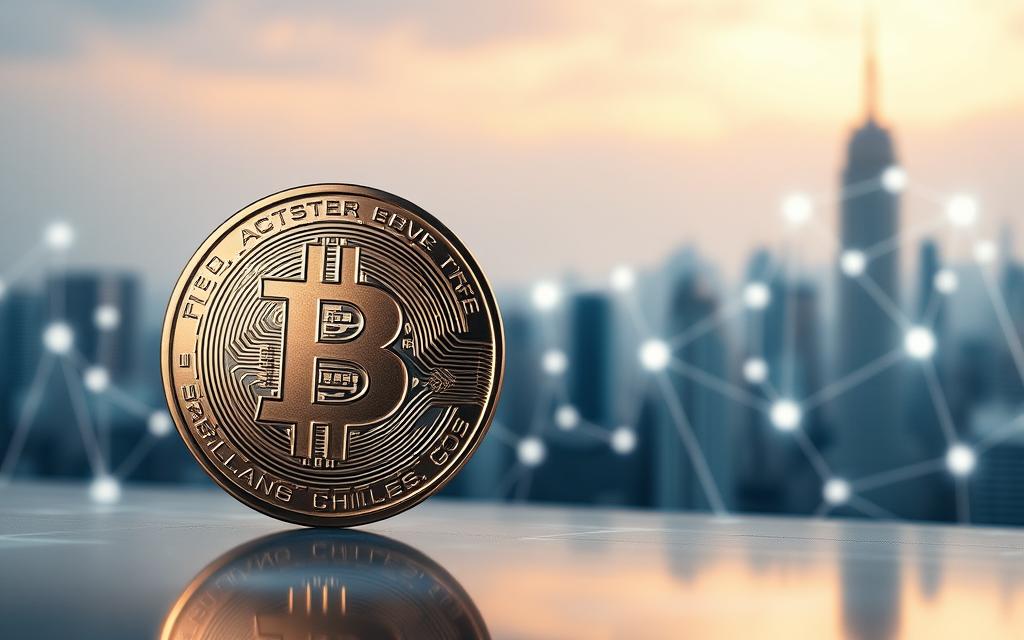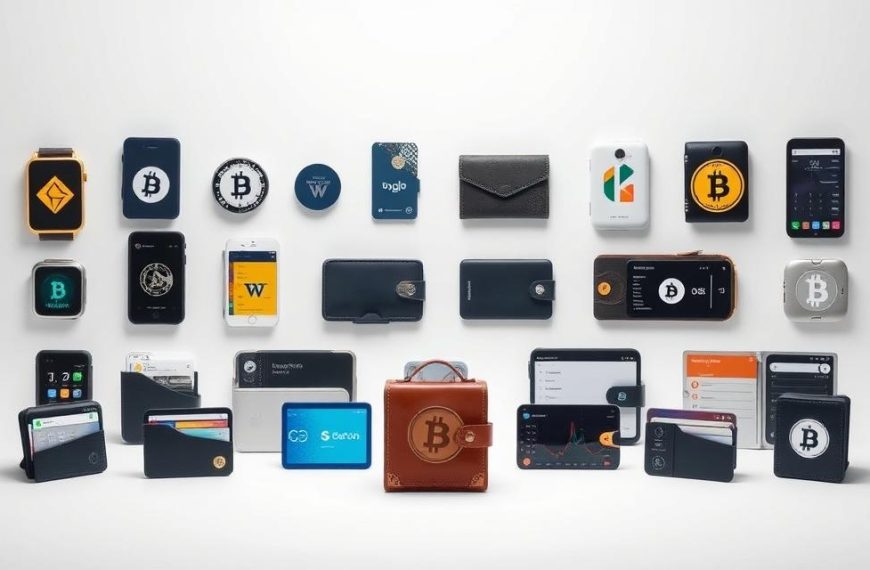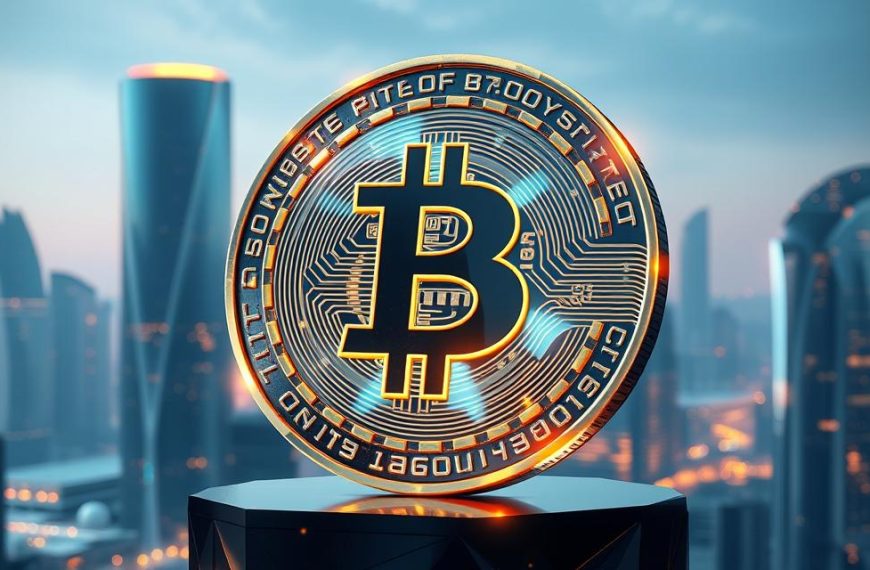The world of cryptocurrency is growing fast. Altcoin tokens play a big role in this growth, using blockchain technology. With thousands of altcoins out there, it’s key to know what they are and how they’re different from Bitcoin.
Investopedia says altcoins are all cryptocurrencies except Bitcoin. Some even include Ethereum in this group.
Recently, altcoins have caught a lot of attention. Many have seen their prices jump by over 500% in just one year. The rise of Initial Coin Offerings (ICOs) has helped this growth. This means more people want to get into digital assets like cryptocurrency and blockchain tokens.
What is an Altcoin Token?
An altcoin token is any digital asset that’s not Bitcoin. The term “altcoin” comes from “alternative” and “coin.” It covers a wide range of digital assets with different functions and features. For those interested in investment, altcoins provide many options, with some focusing on trading and others on security.
Altcoins can improve on Bitcoin in areas like transaction speed and energy use. But, they also have risks like market volatility and legal issues. So, it’s crucial for investors to do their homework and check the security of their choices before trading or investing.
Altcoin tokens make up a big part of the cryptocurrency market, with thousands to choose from for trading and investment. As the market grows, we can expect to see new and better uses for altcoins. This includes better security and more efficient trading platforms.
The Technical Architecture of Altcoin Tokens
Altcoin tokens are built on blockchain technology. This tech allows for the creation, trading, and storage of digital assets. Different consensus mechanisms, like Proof of Stake and Delegated Proof of Stake, are used. For example, Ethereum supports decentralized applications, making it popular for utility tokens.
The blockchain technology in altcoin tokens ensures secure and transparent transactions. Altcoins like Litecoin and Ripple confirm transactions much faster than Bitcoin. Litecoin takes about 2.5 minutes, while Ripple does it in seconds. This makes them better for daily use.
Some notable altcoins and their tech include:
- Ethereum, with over 12,000 decentralized applications
- Litecoin, known for its fast transaction times
- Tether, a stablecoin pegged to the US dollar
The tech behind altcoin tokens is always getting better. As digital assets and utility tokens grow in use, we’ll see more advanced tech. This will lead to even more diverse and complex architectures.
Different Types of Altcoin Tokens
Altcoins come in many forms, each with its own purpose. Stablecoins are tied to traditional assets to keep their value steady. This makes them a safer choice for investors. On the other hand, meme coins like Dogecoin are known for their wild price swings. They are popular due to their fun nature and strong community backing.
When it comes to investing in altcoins, there are a few main types. Utility tokens give you access to blockchain services. Security tokens represent real-world assets and are overseen by laws. Governance tokens let you vote on decisions for a blockchain project.
For those wanting to spread out their investments, knowing about altcoin types is key. Stablecoins help lower risk, while meme coins might offer big gains but with more ups and downs. By thinking about these points, investors can make better choices in the altcoin market.
| Type of Altcoin | Description |
|---|---|
| Stablecoins | Pegged to traditional assets to reduce volatility |
| Meme Coins | Highly speculative and volatile, often driven by community support |
| Utility Tokens | Provide access to services within a blockchain ecosystem |
How Altcoins Differ from Bitcoin’s Framework
Altcoins are becoming more popular in the crypto market, with thousands in circulation. They offer different uses and values, each with its own unique features. The crypto market is known for its ups and downs, with altcoins being more unpredictable than Bitcoin.
Altcoins use different ways to agree on transactions, like Proof of Stake, which is more energy-efficient. They also have their own blockchains, unlike Bitcoin. This variety leads to many uses for altcoins, from payment tools to stablecoins.
Technological Differences
Ethereum and Shiba Inu coin are examples of altcoins that have seen big price jumps. Ethereum’s price has gone up by 500%, and Shiba Inu’s by 380,000% in a year. These coins stand out from Bitcoin with their special features and uses, like cheaper and faster transactions.
Use Case Variations
Altcoins have many uses and are getting more diverse. Some are made to use less energy than Bitcoin. Others are cheaper to invest in because they’re smaller in market size. As the crypto market grows, we’ll see even more new uses for altcoins.
Market Positioning
Altcoins are seen as a cheaper and easier way to get into crypto compared to Bitcoin. They have more liquidity, making them appealing to new investors. As the market expands, altcoins will likely become more important in trading and using crypto.
The Role of Smart Contracts in Altcoin Tokens
Smart contracts are key in making altcoin tokens work. They help create apps that run on their own and handle tasks without human help. This adds a layer of security and governance to digital assets, making sure everything is done right and openly.
Smart contracts are great for making complex deals and rules. They can be used in many fields like finance, real estate, and healthcare. For instance, Ethereum uses them to help developers build apps that run on their own. This helps grow digital assets and makes them safer and better governed.
Smart contracts are fast and accurate, which means they can make things happen quicker and with fewer mistakes. But, once they’re set up, they can’t be changed if there’s a problem with the code.
Let’s look at some examples of how smart contracts help altcoin development:
- Utility tokens, like Filecoin (FIL), offer storage solutions, while Chainlink (LINK) connects smart contracts to real-world data.
- Security tokens, like tZERO, represent ownership in real assets and must often follow rules.
- Governance tokens, such as Maker (MKR), let holders vote on how a project is developed.
In summary, smart contracts are essential for altcoin tokens. They create a safe and well-ordered space for digital assets to grow. As smart contracts get better, we’ll see more new ideas and use in the altcoin world.
| Altcoin | Smart Contract Capability | Industry Application |
|---|---|---|
| Ethereum | Decentralized app development | Finance, real estate, healthcare |
| Solana | Rapid transaction processing | Finance, gaming |
| Cardano | Scalability and sustainability | Finance, supply chain management |
Understanding Altcoin Token Economics
Altcoin token economics are key to their value and stability. The balance between supply and demand, how tokens are distributed, and price mechanisms shape their economic landscape. Tokens with strong use, limited supply, and high demand often see their value rise. This makes them appealing for investment and trading in the crypto market.
Tokenomics studies the economics of cryptocurrency tokens. It looks at total supply, initial distribution, vesting periods, and economic stability. A well-thought-out token economy can create a thriving ecosystem. It encourages participation and drives growth. As the crypto market grows, understanding altcoin token economics is vital for smart investment and trading.
Some altcoins, like stablecoins, are popular for their stable value. They are often pegged to a fiat currency. This stability offers a safe option for investors looking to reduce risks from more volatile cryptos. With the crypto market cap over $2.66 trillion in early 2024, demand for stable altcoins is expected to rise. This will likely spur innovation and investment in this area.
Security Considerations for Altcoin Tokens
Investing in altcoin tokens means security is key. The crypto market is volatile, and altcoins lack a solid backing. With over 20,000 altcoins out there, keeping your assets safe and avoiding scams is vital. The global value of altcoins is around $500 billion, and this number is growing. So, the risk of security threats is also on the rise.
Blockchain tech is crucial for altcoin security. It makes transactions open and hard to tamper with. Smart contracts also help by automating rules and cutting out middlemen. But, starting a token project can be expensive, especially for small businesses.
Investors need to know the risks of altcoin tokens and protect their digital assets. Use trusted exchanges, turn on two-factor authentication, and update your software regularly. Keeping up with new security methods is important. This way, you can safeguard your investments and enjoy a secure experience in the altcoin market.
Some key benefits of security tokens include:
- Increased liquidity through secondary trading on compliant security token exchanges
- Fractional ownership of assets, allowing smaller investors to own parts of high-value assets
- Automated compliance via smart contracts, reducing the need for intermediaries
Popular Altcoin Token Platforms
Several platforms have become popular for altcoin tokens. They offer diversified investment opportunities and innovative use cases. The market is always changing, with new platforms and old ones growing.
Blockchain technology is key to their success. For example, Ethereum’s switch to proof-of-stake (PoS) has made it more efficient. This has boosted Ethereum’s appeal, with its market value nearing $329.5 billion.
Ethereum-Based Tokens
Ethereum-based tokens are in high demand. They include utility tokens and governance tokens. These tokens offer benefits like dividend payouts and voting rights. Ether, Ethereum’s native token, is used to reward network participants.
Binance Smart Chain Tokens
Binance Smart Chain (BSC) is also popular. It has a variety of tokens, including stablecoins and utility tokens. BSC is known for fast transactions and low fees. The Binance Coin (BNB) has a market value of $83.4 billion, with each BNB worth around $585.9.
Solana Token Ecosystem
Solana is growing fast, with a market value of $96 billion. Its token value is around $196.9. Solana’s ecosystem offers fast transaction times and low fees. It also uses a proof-of-stake (PoS) method, making it energy-efficient.
The table below summarizes the key features of these popular altcoin token platforms:
| Platform | Market Capitalization | Token Value |
|---|---|---|
| Ethereum | $329.5 billion | $2,736 (ether) |
| Binance Smart Chain | $83.4 billion | $585.9 (BNB) |
| Solana | $96 billion | $196.9 (SOL) |
Investing in cryptocurrency and blockchain can be profitable. But, it’s crucial to research and understand the risks. With the right strategy, you can explore altcoin tokens and make smart investment choices.
How to Evaluate Altcoin Token Projects
Investing in altcoin token projects needs careful thought. The crypto market is unpredictable, and keeping your investment safe is key. You must look at the project’s technical, fundamental, and risk aspects.
It’s important to check if the project could grow and stay secure over time. Look at its whitepaper, website, and social media. This helps you understand its goals and values. Also, check its trading history, investment plan, and security steps to see if they match your goals.
- Market capitalization: A bigger market cap usually means a safer investment.
- Daily trading volume: A high volume suggests a lively and liquid market.
- Technical innovation: Projects with strong tech and new ideas are often more appealing.
By looking at these factors and weighing the risks and benefits, you can make a smart choice. This way, you can protect your trading and investment.
| Factor | Description |
|---|---|
| Market Capitalization | A measure of the project’s market value. |
| Daily Trading Volume | A measure of the project’s market activity. |
| Technical Innovation | A measure of the project’s technical advancements and solutions. |
The Future Landscape of Altcoin Tokens
The future of altcoins is hard to predict. But, those with strong use cases and a solid blockchain purpose will likely lead. As the cryptocurrency market grows, it’s key to look at altcoins’ basics. This includes their tech, team, and community.
Since 2011, thousands of altcoins have emerged. They serve various needs, like DeFi and NFTs. The digital assets market has expanded a lot. Stablecoins like Tether (USDT) and USD Coin (USDC) aim to keep their value steady.
Altcoins can see big price swings because of their smaller market caps. Yet, many use energy-saving tech like Proof-of-Stake (PoS). The future of altcoins will depend on how well they solve Bitcoin’s problems, like speed and energy use.
The crypto world is getting bigger, and keeping up is crucial. By looking at altcoins’ basics and staying current, investors can make smart choices. This helps them understand the complex world of cryptocurrency and blockchain tech.
Conclusion
The world of digital assets is growing fast, with over 9,000 altcoins out there. These tokens do more than just act as money. They include things like utility, security, governance, and non-fungible tokens (NFTs). Stablecoins like Tether (USDT) and US Dollar Coin (USDC) are big, with values over $100 billion and $30 billion, respectively.
Investing in altcoins can be both exciting and risky. For example, memecoins like Shiba Inu have seen huge spikes and drops. Ethereum and Binance Coin are big players, with Ethereum making up nearly 20% of the market and Binance Coin valued at $69.4 billion. But new coins like Toncoin and Arbitrum could be the next big thing. It’s important to do your homework, understand the tech and the market, and think about the risks before jumping in.
FAQ
What are altcoin tokens and how do they differ from Bitcoin?
Altcoin tokens are digital assets that act as alternatives to Bitcoin. They use blockchain technology but have unique features and uses. This makes them different from Bitcoin.
What is the basic definition and origin of altcoin tokens?
Altcoin tokens are digital currencies made after Bitcoin’s success. They aim to offer different features and uses than Bitcoin.
What are the key characteristics of altcoin tokens?
Altcoin tokens aim to solve Bitcoin’s limitations, like speed and scalability. They have different technical bases and uses.
What are the different types of altcoin tokens?
Altcoin tokens include utility, security, governance, and NFT tokens. Each type has its own use and characteristics.
How do altcoins differ from Bitcoin’s framework?
Altcoins differ in technology, use, and market position from Bitcoin. They aim to improve or offer alternatives to Bitcoin’s network.
What is the role of smart contracts in altcoin tokens?
Smart contracts are key in many altcoin projects, especially on Ethereum. They enable self-executing agreements.
How do the economics of altcoin tokens work?
Altcoin tokens’ economics involve token distribution, price, and market size. These factors vary among different altcoins.
What are the security considerations for altcoin tokens?
Altcoin tokens face risks like volatility and scams. It’s crucial to take security measures and invest wisely.
What are some of the popular platforms for altcoin tokens?
Altcoin tokens are built on platforms like Ethereum, Binance Smart Chain, and Solana. Each platform supports different altcoins.
How can investors evaluate altcoin token projects?
Investors can use technical and fundamental analysis to evaluate altcoin projects. This helps in making informed investment choices.
What is the future outlook for altcoin tokens?
Altcoin tokens’ future depends on tech advancements, regulations, and market needs. Projects that meet these needs may see wider adoption.




















